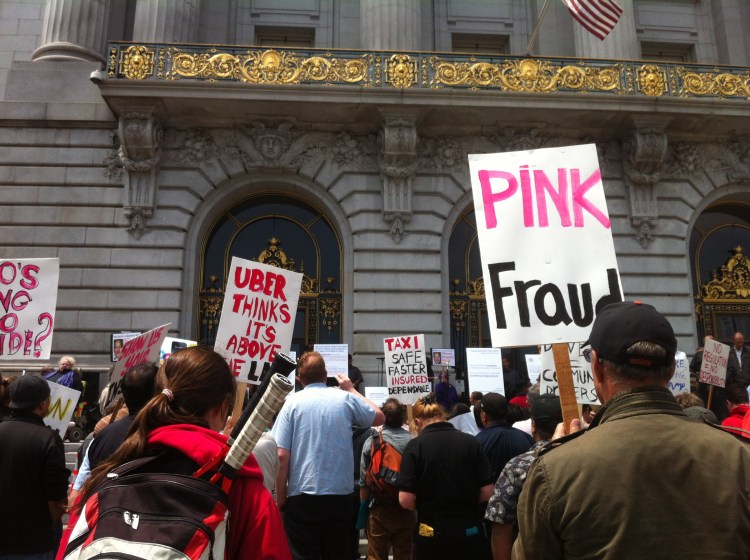Update 5pm PT 7/30/2013 The CPUC came out with a proposed decision for ridesharing startups, including new lightweight regulations, just hours after the protest ended.
SAN FRANCISCO — San Francisco cab drivers protested ridesharing startups at City Hall today.
The streets around Civic Center were filled with taxis sitting bumper-to-bumper, blocking traffic and filling the air with incessant honking. Members of the cab driver community waved signs protesting Lyft, Uber, and SideCar, while others took the podium on the steps of City Hall to speak out against these companies, which they say are operating illegally, unfairly, and posing a threat to public safety.
“Illegal taxis and services must be stopped,” one speaker said. “We are highly regulated, trained, legally insured, and we drive regularly inspected vehicles — for a reason. We are against the buzzword ‘rideshare.’ Those unlicensed drivers are road bandits. We are the real community drivers.”
The protest was directed at San Francisco’s Mayor Lee and the California Public Utilities Commission (CPUC) which is in the process of evaluating ridesharing services and expected to come out with a proposed decision this week. The commission opened proceedings in December 2012 after concerns were raised over the lack of regulation surrounding these services and public safety. Cab drivers, cab companies, and cab associations around the country have spoken out against ridesharing startups, but the issue is perhaps most poignant in San Francisco where these startups are based and gained their initial traction.
“We command Mayor Lee to follow the law,” said Trevor Johnson, director of the San Francisco Cab Driver Association (SFCDA). “Innovation is not stealing from others.”
The SFCDA has called these companies and their drivers criminals and said they are putting the industry under attack by avoiding regulations and insurance requirements. Barry Taranto was a cab driver for 14 years and told VentureBeat that his main concern with ridesharing companies is insurance.
“Personal auto insurance does not cover these drivers if there is an accident,” he said. “If you read those companies’ disclosures and waivers, it exonerates them from negligence. Those vehicles aren’t inspected to see if they are safe. Real cab drivers go through Department of Justice background checks, they receive proper training, and they are safer for the streets.”
Personal insurance policies do not cover vehicles driving passengers for a fee. Lyft and SideCar are technically donation-based and tout a $1 million excess liability insurance plan that the companies’ claim cover drivers and passengers in the event of an accident. All of the cab drivers I spoke with said that these policies are inadequate and expressed a host of other concerns as well.
Jean Feilmoser received her first cab permit in 1978 and has been driving cabs in San Francisco ever since. She said that driving a taxi in San Francisco is expensive. Medallions can cost as much as $300,000 and cab drivers have to pay their companies to take taxis out, as well as pay for a business license, gas, and penalty fees if they return the vehicles late. Feilmoser said that money helps pay for commercial insurance, salaries, human resources, radio systems, inspections, new vehicles, and taxes to the cities.
“People should support taxis who are licensed to do what we do,” she said to VentureBeat. “We know where we are going, we know where the hospitals and hotels are, and we give back to the city. Those ridesharing startups pay the city nothing. Now I have to work for 12 hours to make what I used to be able to make in 8.”
Multiple speakers and participants emphasized that they are not opposed to modernizing their methods, and expressed support for companies like Flywheel and TaxiMagic, which give traditional taxis the ability accept “e-hails” and payments from smartphones, along the lines of Uber, Lyft and Sidecar.
This drama has continued to unfold over the past year or so. Most of the regulations and policies surrounding the taxi industry were written long before the era of smartphones and the sharing economy. There are a lot of questions that need to be answered and a lot of safety and operational issues that need to be figured out. Ridesharing startups have fought legal battles around the country, facing fines, receiving cease and desist letters, and in some cases getting shut down by the authorities. CBS reported today that San Francisco International Airport officials are arresting ridesharing drivers who pick up passengers at the airport without a permit, and last week Los Angeles told Lyft, Uber, and Sidecar to suspend their operations.
Tension is mounting and all parties involved are anxiously awaiting the CPUC proposal, which will in many ways determine their fate.


